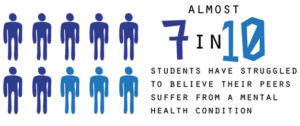
NAMI College Guide to Mental Health - Starting the Conversation

Scan for "This is Normal" podcast where young people talk about their own mental health challenges - and how they got through them.
7 Parent Tips on How to
Prepare Your Student for College
Each year, approximately four million students enroll in college for the first time. It’s an exciting and challenging experience for both parents and their college-aged children.
Without a doubt, the transition to college can be overwhelming for some students. Coupled with the fact that many mental health issues often emerge during an individual’s early twenties, it’s important for parents to have a mental health checklist on hand.
What can you as a parent do? Check out these tips on how to empower your student to successfully navigate the unfamiliar waters of college life.
Active Minds Students7 Parent Tips on How to Prepare Your Student for College

|
The purpose of this page is to help identify the signs and symptoms of common mental health issues for students — and where and when to seek help. Left untreated, these issues can become debilitating and even life-threatening. If you feel that you may be experiencing these issues or find yourself concerned for a friend or peer, it is important to take action now. Mental illness is a real life threatening illness which can make you not see that you are sick. You lose insight to what is happening to you because your brain is fighting a disease.
And don’t forget: you’re not alone. Mental illness is very common among students today. According to mental health research conducted by the National Alliance on Mental Illness (NAMI):
|
If a friend is sick
It may be difficult for you to approach a friend regarding these illnesses. After all, people often dislike being told that they’re sick, what they’re feeling, or what they should do. It’s wise to be supportive and patient, but applying too much pressure on a friend can make the situation worse. Share your concerns with a parent, a teacher, or other trusted person who can help.
If you are sick
If you believe that you’ve developed a mental health illness, try to remember that your friends are looking out for your best interests. They want you to be well, and they are not attacking you. Talking about your problems with someone close to you may seem like a daunting task, but try to let them help you until you are ready to seek the professional help you need to get better.

MHA recently released Making Space for Mental Health on Campus.
The 2nd report from MHA’s Collegiate Mental Health Innovation Council (CMHIC) that showcases student-led programs that are filling gaps in traditional mental health services and supports on campuses across the United States.
By highlighting the work of specific student leaders in mental health around the country, the report focuses on what is important to students and provides summaries and guides to programs that student advocates can bring to their colleges and universities. The report uses feedback from current members of the CMHIC, a group dedicated to promoting and expanding the work of student-leaders who have found creative ways to support their peers.
Check out the full report, including video interviews with each member, here.
"Study Stress Infographic — 15 Things You Need to Know" discusses the common stress sources and some stress management methods. Also, the readers will learn about a gap year as an option to consider when the stress level is too high and students Find the full infographic here: ivypanda.com/blog/study-stress/
Getting a good night’s sleep in college can be tough. There’s an old saying: In college, you can have a great social life, get good grades, and get adequate sleep. Oh, but you can only have two of those three things at once!For many students, sleep goes on the back burner. According to the University of Georgia Health Center, college students sleep an average of 6 to 6.9 hours each night. Another study found that around 70 percent of college students aren’t sleeping enough. Research suggests that a lack of adequate sleep can affect grades, mood, and even safety while driving.
So why aren’t college kids sleeping enough — and how can they fix the issue? Here’s everything you need to know. Read more here: www.mattressclarity.com/blog/ultimate-guide-sleeping-better-college-campus/

Suicide Prevention and Awareness
Suicide is one of the leading causes of death in the United States. In fact, it is the 10th leading causes of death, and it claims approximately 44,000 people every year. Statistics show that men are more likely to commit suicide than women. And, among youth, suicide is the 2nd leading cause of death.
www.wristband.com/content/suicide-awareness-and-prevention/
